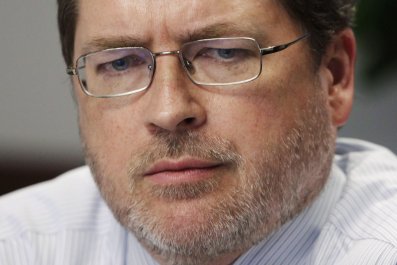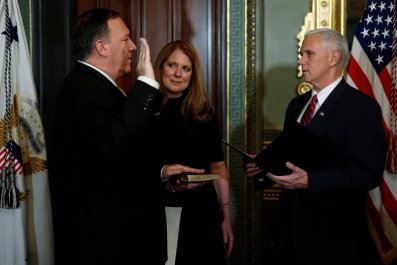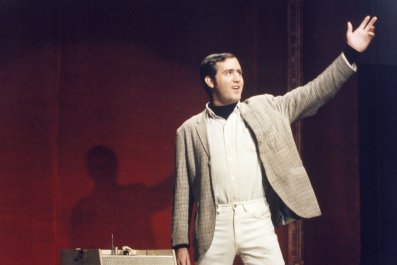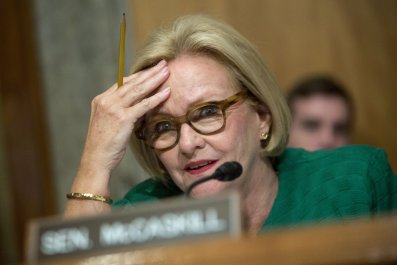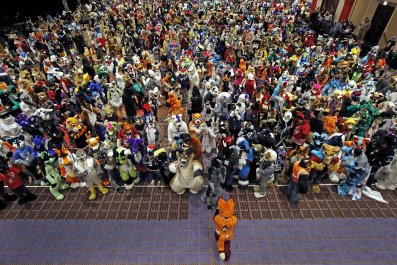Mark Cuban is flagrantly flirting with the notion of running for president in 2020, so I asked him if a big driver of his decision might be a belief that the nation desperately needs tech-savvy leadership. "Yes," the entrepreneur and NBA team owner quickly replied via email. "The current administration's lack of understanding of technology places our country at risk for unthinkable harm."
Yikes! And here we've been distracted by worries that Little Rocket Man might lob a nuke toward Los Angeles and probably hit Bakersfield instead. Clearly, the techno alarm Cuban raises is something we need to unpack.
First of all, the U.S. suffers from the biggest gap in history between technology and what our nation's leaders know about technology. Our president is 71 years old and thinks Twitter is miraculous. He doesn't use a computer and wouldn't know Slack from Spanx. He's equated sophisticated hacking with his young son's ability to crack a home computer parental control password. He's a climate change denier and would rather save coal jobs than invest in solar energy. Basically, Donald Trump has done nothing to suggest he'll ever embrace an innovative technology solution to a pressing global problem.
Congress isn't much better. The average age of U.S. senators is 61.8, among the oldest in history. Of the 435 House members and 100 senators, just eight have worked as engineers, six as software executives and three as venture capitalists. None of the other pre-politics career paths would suggest a real understanding of artificial intelligence (AI) or blockchain. By this count, the Capitol has more former insurance agents (21) than former technologists (17).
At the same time, the U.S.'s 83 million millennials, now ages 17 to 35, are all about technology. They embrace AI-driven chatbots and watch streaming video instead of TV. About 83 percent of them sleep with their cellphones. To this group, technology is as indispensable as underwear, and they are leading us into an epoch of enormous change driven by AI, blockchain, 3-D printing and a host of other emerging inventions. Jobs, war, transportation, money, national identity—technology is changing all of it. There could be nothing crazier right now than electing another batch of tech nincompoops to national office.
This is what Cuban is getting at. A lot of people know him as the star of reality-TV show Shark Tank or as the bombastic owner of the NBA's Dallas Mavericks. But I first met him in 1999 when he was running one of the first streaming-media companies, Broadcast.com—which he sold to Yahoo later that year for $5.7 billion. In the years since, I've talked with Cuban about his investments in tech, ranging from the Cyber Dust app that makes texts disappear to Brondell electronic toilet seats. At 59, he's no millennial, but he qualifies as a billionaire technologist.
He says our leaders' most dangerous offense is their inability to recognize the profound importance of AI. "If you look at Russia and China, both are leveraging government and private investment to try to dominate AI," Cuban says. Both nations, he notes, believe that dominating AI is the path to global superpower status in this century. Yet the Trump administration and Congress have done little to promote or invest in AI research. Instead, Trump spurns science the way kids scorn lima beans.
The U.S., Cuban believes, needs a national mission in AI reminiscent of the push to triumph in the space race in the 1960s. "We have to win this battle, or we will no longer be the most powerful nation in the world," he tells me. "AI is going to be at the base of every war and terror threat we face for the next 50 years at least. We can't lose this war."
That's the aforesaid "unthinkable harm."
On so many other issues, the nation's leadership is stuck in 20th-century thinking when we need 21st-century innovation. Immigration and terrorism? "The idea of putting up the [Mexican border] wall is one of the dumbest ideas I've heard in my entire life," Cuban said this month at an event called the Edge of Texas. He called the wall "the least technological solution that's easiest to crack." More serious security threats will come in through fiber optics and cloud computing—cyberattacks that can damage infrastructure, steal critical data or blast the American public with fake news. "I'm more concerned with bytes than I am with bullets," Cuban says.
Health care? The whole battle in Washington is over insurance—Obamacare, Medicare. Insurance is a last-century solution to the problem of rocketing health care costs. Yet the tech industry knows that AI, Big Data, the "internet of things" and genomics could radically lower the cost of health care while making it better and more personal. Exactly zero national leaders are focused on making that the solution.
Transportation over the next decade will go electric in a big way, followed by the arrival of self-driving cars and trucks. It's hard to imagine how enormous that change will be. We'll have to think anew about energy, roads, commuting, parking lots, the right location for every McDonald's and 7-Eleven. It will be the biggest shift since the 1950s, when the interstate highway system remade the landscape. China's policymakers seem to be planning for a radically different transportation future. U.S. leaders seem to hope that future will shrivel and die. Trump recently floated a plan to drop tax credits for electric cars. If implemented, it would hobble U.S. automakers' push to go electric, leaving them behind the rest of the world.
Cuban puts his chances of running for president at just 10 percent, but he has Steve Bannon in his corner. (Good or bad? Bannon denies climate change but is equally worried about China's AI dreams.) But we don't need Cuban to fix the U.S. leadership void. The tech industry is packed with brilliant, charismatic leaders who could enter politics—people like Apple CEO Tim Cook or Facebook's Sheryl Sandberg. Among real politicians, Senator Mark Warner of Virginia, who has been leading the congressional questioning of Facebook, Google and Twitter over Russian interference in the 2016 election, made a fortune investing in mobile tech companies before running for office.
The American tech sector has long disdained politics, usually believing it's easier to change the world with software than with policy. But now, in the Trump era, it better step up, or we'll wind up as some quaint old nation serving the Chinese AI gods and rooting for the Guangdong Southern Tigers once the Chinese Basketball Association blows past the NBA as the world's wealthiest basketball league.
Oh. Maybe that's the harm Cuban finds unthinkable.




